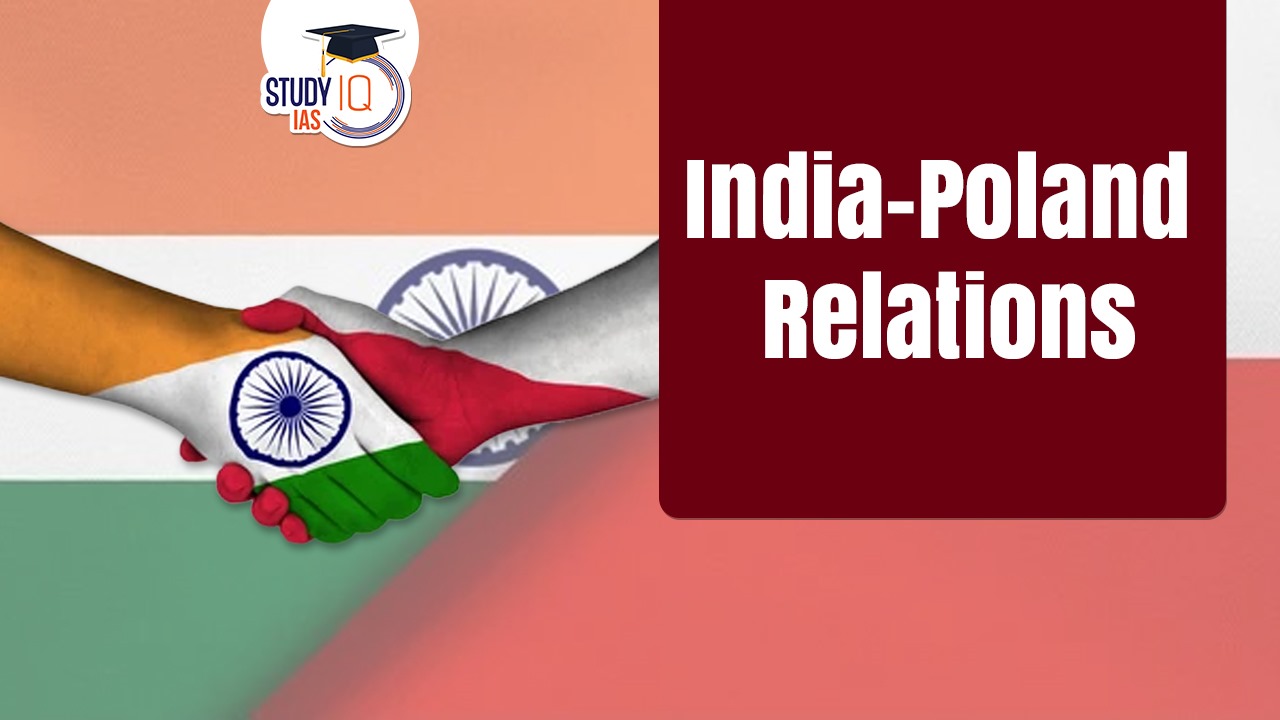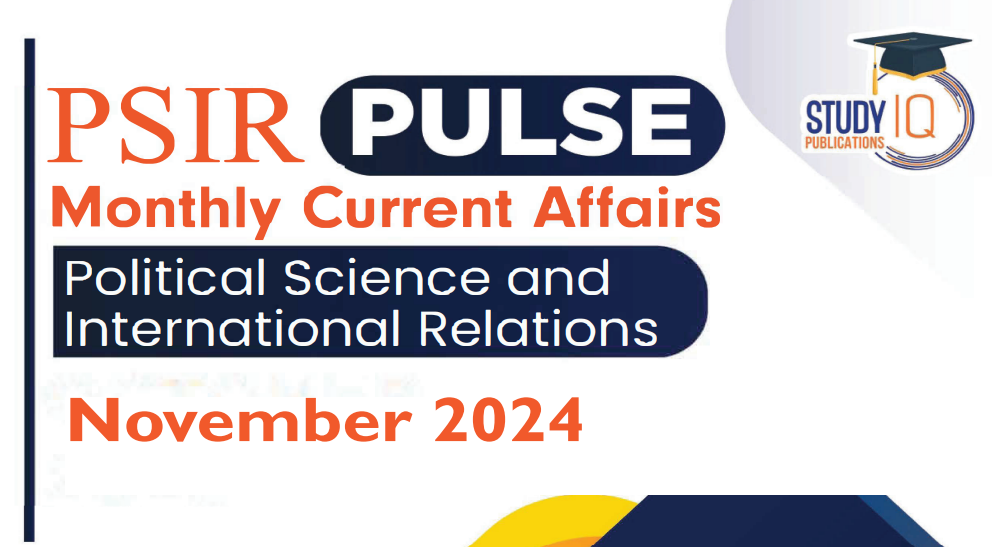Table of Contents
Context: The Prime Minister of India arrived in Warsaw (Poland) to meet the Prime Minister of Poland. A recent visit of PM Modi to Poland has been concluded.
Key Highlights Of the PM Modi Visit to Poland
- Strategic Partnership: India and Poland have decided to elevate their relationship to a “strategic partnership” and will create a five-year action plan (2024-2028) to guide their cooperation.
- Priority Areas for Cooperation: The action plan will focus on several key areas, including political dialogue, security, trade, investment, climate change, energy, mining, science and technology, transport, connectivity, counter-terrorism, cyber security, health, cultural exchanges, and people-to-people connections.
- Opportunities in Food Processing: Poland has expertise in food processing and Polish companies are invited to invest in India’s mega food parks.
- Urbanisation and Infrastructure: India’s rapid urbanisation creates opportunities for collaboration in water treatment, solid waste management, and urban infrastructure.
- The common priorities such as clean coal technology, green hydrogen, renewable energy, and artificial intelligence.
- Youth Exchange Program: A new youth exchange program called the Jam Saheb of Nawanagar will be launched, where 20 young people from Poland will visit India each year.
- Make in India Invitation: Polish companies were invited to participate in the “Make in India” initiative and produce goods for the global market.
- Social Security Agreement: India and Poland agreed to work on a social security agreement to benefit skilled workers and promote worker mobility between the two countries.
- Space Cooperation: Both countries agreed to finalise an agreement to promote the safe, sustainable, and secure use of space, including both human and robotic exploration.
- Poland also acknowledged India’s goal to join the International Energy Agency.
- Promoting Cultural and Sports Ties: The visit highlighted the cultural connection between India and Poland, particularly through Kabaddi, as Poland is set to host the Kabaddi championship for the first time.
Areas Of Cooperation Between India and Poland
Historical and Diplomatic Relations
- During World War II, the Maharaja of Jamnagar provided refuge to several hundred Polish women and children trying to reach the West, sheltering them on his estate in Gujarat for several months.
- In 1944, Poles and Indians joined forces to retake the hill and monastery of Monte Cassino, pushing out German forces and opening the Allies’ path to Rome.
- In 1954, diplomatic relations between India and Poland were formally established, leading to the opening of the Indian Embassy in Warsaw in 1957.
- Shared ideological perceptions: The two countries found common ground in their opposition to colonialism, imperialism, and racism.
- During the Communist era, bilateral relations were particularly close and cordial, marked by regular high-level visits, including several from India, beginning with Prime Minister Pandit Jawaharlal Nehru in 1955.
- After Poland adopted democracy in 1989, the relationship remained close. Both countries transitioned to hard currency trading, which grew as their economies expanded.
- A cordial political relationship continued to develop, especially after Poland joined the European Union in 2004, making Poland a key economic partner for India in Central Europe.
Economic and Commercial Relations
- Poland stands as India’s largest trading and investment partner in Central and Eastern Europe.
- Over the decade from 2013 to 2023, bilateral trade between the two countries has seen significant growth, with a 192% increase, rising from US$1.95 billion in 2013 to US$5.72 billion in 2023.
- The balance of trade remains largely in favour of India as of 2023.
| Sector Wise Growth |
Mining/Energy Sector
Pharmaceutical and Chemicals Sector:
Textile Sector
|
Cultural and Educational Relations
- Poland has a strong tradition of Indology studies, with universities like Jagiellonian University, University of Warsaw, and Adam Mickiewicz University playing pivotal roles in promoting Indian studies.
- Poland has a long history of yoga, with over 300,000 practitioners and around 1,000 yoga centres.
- Historical ties, commemorated through monuments and annual meetings, celebrate the assistance provided by Jam Saheb of Nawanagar to Polish refugees during WWII.
- Busts and streets in Poland are named after Indian leaders like Mahatma Gandhi and Rabindranath Tagore.
Consular Relations
- India has an Honorary Consulate in Wroclaw, while Poland has two Honorary Consulates in Kolkata and Bengaluru.
- Poland has been included in India’s e-visa scheme since August 15, 2015, facilitating tourism and business visits.
- Approximately 25,000 Indians reside in Poland, including traders, professionals, students, and restaurateurs.
| Key Highlights of Prime Minister Narendra Modi’s Visit to Poland |
|
Significance of Poland
- Poland is the largest economy in Central Europe and ranks 6th in the European Union and 21st globally.
- In 2024, Poland’s GDP is projected to be approximately $844.6 billion.
- Poland’s presidency of the European Union in January 2025 will help strengthen India-EU relations.
- The country has a diversified economy with significant contributions from industries such as machine building, iron and steel, mining, and food processing.
- Poland plays a critical role as the West’s hub for operations in Ukraine, leads NATO’s eastern flank, and contributes to the construction of a new security architecture in Europe against Russia.
Recommendations for Poland–India Relations
- Focus on Research and Development: Bilateral cooperation should prioritise research and development, especially in electromobility and hydrogen-related technologies, green technologies, space sector solutions, and climate-friendly mining.
- Enhance Business Contacts: Increasing business interactions, including at the startup level, is essential for fostering innovation and growth in both countries.
- Expand Collaboration in Key Sectors: There is significant potential for expanding cooperation in the defence, IT, and security infrastructure sectors.
- Strengthen Aviation Links: Direct air connections between New Delhi, Mumbai, and Warsaw should be leveraged to strengthen business, scientific, and tourism ties.
- Poland’s aspiration to create a new aviation hub in Europe could align with India’s expanding aviation infrastructure.
- Leverage Maritime Collaboration: Poland, with Europe’s largest ship design office and advanced shipyards, could be a key partner in India’s Sagarmala maritime infrastructure expansion programme, which includes subsidies for ecological ports and shipyards.
- Invest in Land Infrastructure: Poland could explore opportunities in India’s expanding land infrastructure, particularly roads and rail lines developed through industrial corridors.
- Adopt a New Perspective on India: Poland should recognize India as a rising global player and offer comprehensive, mutually beneficial cooperation, including the supply of military equipment, food, and scarce products, along with financial support.
- Strengthen Business Cooperation through Trade Agreements: Signing an India-EU trade and investment agreement would significantly enhance business cooperation and Poland’s reputation in India.
- Address Security Concerns: Encourage India to take a more assertive position in international forums, particularly regarding the global implications of the Ukraine conflict.
- Highlight the importance of India supporting the “democratic world” against neo-imperialism and military aggression, in line with its aspirations for a permanent UN Security Council seat.
- Consider Geopolitical Dynamics: Poland should emphasise the importance of preventing closer ties between Russia and China, as this could negatively impact India, given the ongoing tensions between India and China.


 Crime Against Humanity (CAH Treaty)
Crime Against Humanity (CAH Treaty)
 India-Sri Lanka Relations, Areas of Coop...
India-Sri Lanka Relations, Areas of Coop...
 White House reveals plan to tackle anti-...
White House reveals plan to tackle anti-...




















